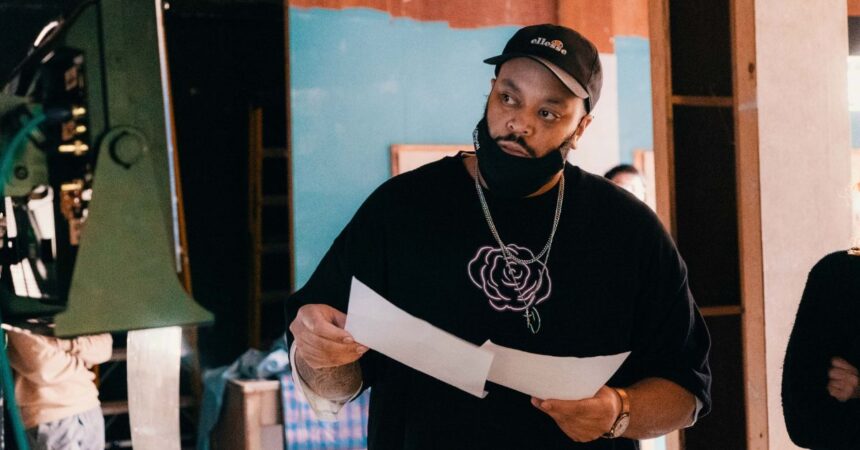Spending time with beautiful and kind people all day for 3-6 days and watching them work on your baby is one of the most special experiences you can have as a filmmaker. And then finally sharing your baby with the world can be scary and exciting but ultimately it’s always full of love and joy.
Welcome to Hurwitz.TV’s Directors Interview Series, where we chat with some of the most influential filmmakers from all over the world.
In this series, you’ll have the opportunity to gain profound insights from the minds and creative journeys of these cinematic storytellers. Our goal is to explore the art of filmmaking, discover the inspirations and motivations that drive these directors, and delve into the captivating stories behind their remarkable works. From seasoned veterans to emerging talents, we talk about their artistic influences, memorable experiences, and the challenges they’ve faced along the way.
Today, we are joined by British filmmaker R.M. Moses. His stories often revolve around disability, invisible illnesses, and intimately complicated queer relationships. Some of the standout recognitions include selections at prestigious film festivals that hold BAFTA and Academy qualifications, such as Los Angeles ShortFest, Norwich Film Festival, and Aesthetica Film Festival. Additionally, Remi’s films have been chosen for screening at various smaller festivals in locations like New York, Australia, Sweden, and Glasgow.

Dennis: Thank you for joining us! To kick things off, can you share the story of you wanting and deciding to become a filmmaker? What drove you to pursue this career path?
R.M.: I started off as a photographer and was lucky enough to be shooting whilst the DSLR revolution was happening. It meant that you could then use the movie function on cheap cameras and so I started making YouTube content. My main training came from those years of trial and error making music videos, and shooting interviews for GrimeDaily (GRM Daily) and other popular YouTube channels. But after 6 years of making music-related content, I wanted to fuse my English literature skills with videography and just dove headfirst into making a 10-minute short film with friends. My first couple of films went to small film festivals, and that was the beginning of getting the bug for sharing stories in this medium.
Dennis: What was the greatest piece of advice given by a mentor that shaped the artist that you are today?
R.M.: When I used to play football, I played at a high level and had a coach who always preached to “do the basics well” which I always think about. I think there’s something very different between doing something simple and doing something basic. I think it could apply to anything, but you need a thorough understanding of the basics to make strong foundations in your work. From there, it’s about finding your style/voice and experimenting.
Dennis: Which movies and filmmakers inspired you the most?
R.M.: Spielberg is number one. I speak about this a lot, but E.T. really was my earliest memory of watching a movie and crying my heart out. The magical lighting and beautiful storytelling have been a staple in my filmmaking ambitions. Nowadays, the filmmakers that really influence my work are Mike Flanagan, Pablo Larraín, Ryan Coogler, and Fincher.
Dennis: What are the most challenging and rewarding parts of making a movie?
R.M.: I think the most challenging is the problem-solving that starts with your budget. There’s never enough money to make shorts, and so you have to cut from places to make the other departments work. Sometimes that wide scope you had when writing the film has to be narrowed down to become a more realistic production because the funding would dictate how many days you shoot or how many actors you can hire, etc. There’s a lot of sacrifice that you have to make at every point of the filmmaking process that not many people talk about. I think the rewarding part is making something with authenticity and passion, and with people who are also passionate about your story. Production is always the highlight of the process because every department is working fluidly and as a director, you’re often not doing anything. Spending time with beautiful and kind people all day for 3-6 days and watching them work on your baby is one of the most special experiences you can have as a filmmaker. And then finally sharing your baby with the world can be scary and exciting but ultimately it’s always full of love and joy.

Dennis: Let’s talk about your short film “Saving Art,” which deeply moved me on a personal level. Can you talk about your experience in making this movie? And how important was it for you to tell this story?
R.M.: It was a truly magical experience; I can’t really use a better adjective. I struggle to articulate it because from day one of film school, your grad film is put on a pedestal and a lot of people feel pressure to make the best thing possible. I went into film school with a lot of previous experience making films, so I was ready to make something as thoughtful and fleshed out as Saving Art. The shoot was really special, and it was mainly down to our crew selection. We had such a wonderful selection of people to work with every day. It was always fun and full of laughs all day. I wrote this film in 2016 and I always knew it needed funding to make it possible because I needed an authentic hospital and child actors. I felt a sense of significance when making the film, just because it was based on true stories/events of children’s experiences in the hospital. As pre-production rolled on, we started to talk about the tone of the film and just how mature we wanted to be with telling this story because it was easy to tell it from the kids’ perspective and make it a little cheesy and fantastical. In telling this story from the parents’ point of view, there is a real sense of dread and maturity that comes with the darkness of cancer, that you just don’t get with the naivety of young children.

Dennis: I loved your creative choices in the film, which I found equally cathartic and devastating. Walk me through how you conceptualized the story and your choice of utilizing imageries and metaphors to translate chemotherapy as a source of “superpower” for a child with cancer?
R.M.: A lot of it was based on the source material and the stories I would read about the children’s ward at the time my Niece got diagnosed with Leukaemia. So we had a good understanding of how “lies” would haunt the parents in the film, and that kind of dictated how we approached the shot selection. Initially, we wanted to give a lot of weight to the dread, the darkness, and silences, and I think the aspect ratio aids that in a way. Me and Andy (my DP) wanted to be gentle and subtle with the imagery and we talked about incorporating zooms into some of the scenes to give a sense of slowly intruding in on our characters’ space. It’s really subtle but really effective in the mood and tone. A big reference for the imagery was Cure by Kurosawa. I loved the idea of playing with depth, and lingering wide shots. I think for the feature film I’m developing, I’m leaning more into all of these things to heighten the sense of darkness haunting the parents.
Dennis: Lastly, what advice would you give to anyone who aspires to be a filmmaker?
R.M.: There’s been a lot of discourse from privileged filmmakers saying to underprivileged people “just to go out and make films” because phones are basically the same as cinema cameras now. Which is nonsense, of course, but I do agree with the sentiment of “stop waiting and go and make something” which is something I have proven to do before film school. I think it’s mainly about finding your tribe and finding people who believe in you so you can lean on each other for growth. Find people who have a camera, or a drone, or people who can act and just make whatever you can with whatever you have. I saved up some money for every film I made just to cover food and travel for everyone involved because I couldn’t afford to pay them. If you make something with heart, people will feel it and donate their time and energy to help you. Go all in on yourself and dedicate your life to getting better. People will pick up on ambition and determination and get behind people who make things happen based on sheer passion.




